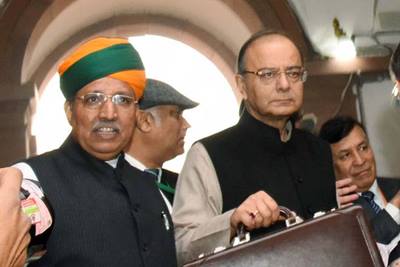The Budget has presented a fine balance between focus on core sectors that need urgent attention and fiscal prudence. It tries to address multiple constituencies from rural India, underprivileged to urban youth and digital India. While the government has already implemented its big ideas such as the GST and demonetisation, the Budget is more a continuation of government policies as opposed to any new big idea.
The government has maintained a fiscal deficit target of 3.2% of the GDP for FY18 and 3% for FY19, which reflects fiscal prudence and should help contain inflation and interest rates. The gross borrowing is largely unchanged at Rs 5.80 lakh crore in FY18, (Rs 5.82 lakh crore in FY17 BE); however, the net market borrowing is projected to be lower at Rs 3.50 lakh crore as against Rs 3.65 lakh crore in FY17 (BE). The finance minister has also kept growth estimates of direct and indirect taxes within realistic targets. This should be in line with the expectation of bond market.
You may also like to watch:
[jwplayer zR0znqjE]
From the equity market perspective, while markets were disappointed with no corporate tax cut for large listed companies Above R50 crore turnover), no change in long-term capital gains tax on equities has come as a relief. Also, the clarification on the outstanding issue of indirect transfer taxation of FPI investments in Indian listed companies removes the overhang from the markets and will be viewed positively by foreign investors. With respect to the MF industry, further issues of CPSE ETF in coming year augur well for development of the ETF market.
Privatisation of IRCTC, IRCON and IRFC is a smart move. This will improve access of funds for railways and help towards developing better infrastructure. Other notable measure is according of infrastructure status to housing. This is a big positive as the housing sector is not only a big employment generator but also has a large multiplier effects for the economy.
The FM spoke at length about the large-scale tax evasion in the economy. There was also significant emphasis on big data utilisation to track tax evaders. This is welcome, and if implemented well, can help improve the tax-to-GDP ratio.
Suresh Soni
CEO, DHFL Pramerica Asset Managers


